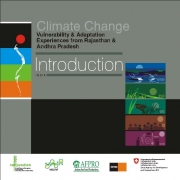 This document discusses the process oriented programme of Swiss Agency for Development and Cooperation (SDC) on Vulnerability Assessment (V&A) and Enhancing Adaptive Capacity to Climate Change initiated in the semi-arid regions of India. The aims of this programme include strengthening the resilience of local communities to conditions of unfavourable weather, like adverse alterations in temperature and precipitation leading to the more frequent occurrence of drought and to use the experiences for policy development for climate change adaptation measures at various levels.
This document discusses the process oriented programme of Swiss Agency for Development and Cooperation (SDC) on Vulnerability Assessment (V&A) and Enhancing Adaptive Capacity to Climate Change initiated in the semi-arid regions of India. The aims of this programme include strengthening the resilience of local communities to conditions of unfavourable weather, like adverse alterations in temperature and precipitation leading to the more frequent occurrence of drought and to use the experiences for policy development for climate change adaptation measures at various levels.
Over 60 per cent of the cultivated area in India is rainfed & unfavorable and uncertain rainfall patterns will seriously affect the food, drinking water and livelihood security of millions of children, women and men. Since the initiation of this project, the emphasis on proactive research on adaptation mechanisms has increased at the national level.
The present decade may mark the beginning of a new climate era, characterized by extreme and often unpredictable weather conditions and rise in sea levels. The greatest casualty of climate change will be food, water and livelihood security.
For the V&A study, the States of Rajasthan and Andhra Pradesh were chosen for developing climate change adaptation measures. The districts chosen were Udaipur in Rajasthan and Mahboobnagar in Andhra Pradesh. The approach adopted was to bring about a blend of traditional wisdom and modern science through farmer participatory research.
The participatory research and knowledge management systems adopted under this programme during the past five years have provided many useful insights for policies and strategies towards developing a climate resilient farming and livelihood security system. Five of the meaningful V&A interventions were as follows –
- Water conservation and sustainable and equitable use;
- Promoting fodder security;
- More crop per drop of water;
- Weather information for all and climate literacy; and
- Strengthening community institutions.
The above interventions were supported by training, skill development, education and social mobilization. A training manual was prepared by MSSRF for training a male and a female member of every panchayat as Climate Risk Managers. Such local level Climate Risk Managers are well trained in the art and science of managing weather abnormalities. The present project has highlighted the need for location specific adaptation measures and for participatory research and knowledge management.
The V&A interventions have also highlighted the need for mainstreaming gender considerations in all interventions. Women will suffer more from climate change, since they have traditionally been in-charge of collecting water, fodder and fuel wood and have been shouldering the responsibility for animal care and post harvest technology. All interventions should therefore be pro-nature, pro-poor and pro-women.
Download the report here:
/articles/climate-change-vulnerability-and-adaptation-experiences-rajasthan-and-andhra-pradesh